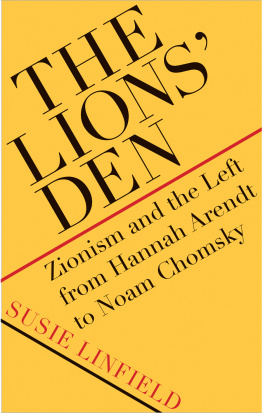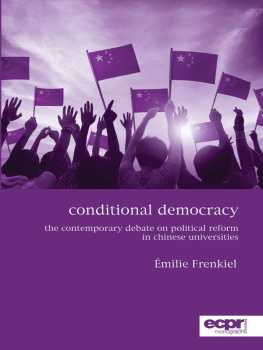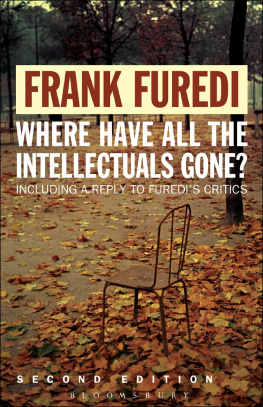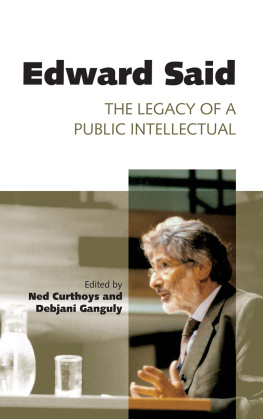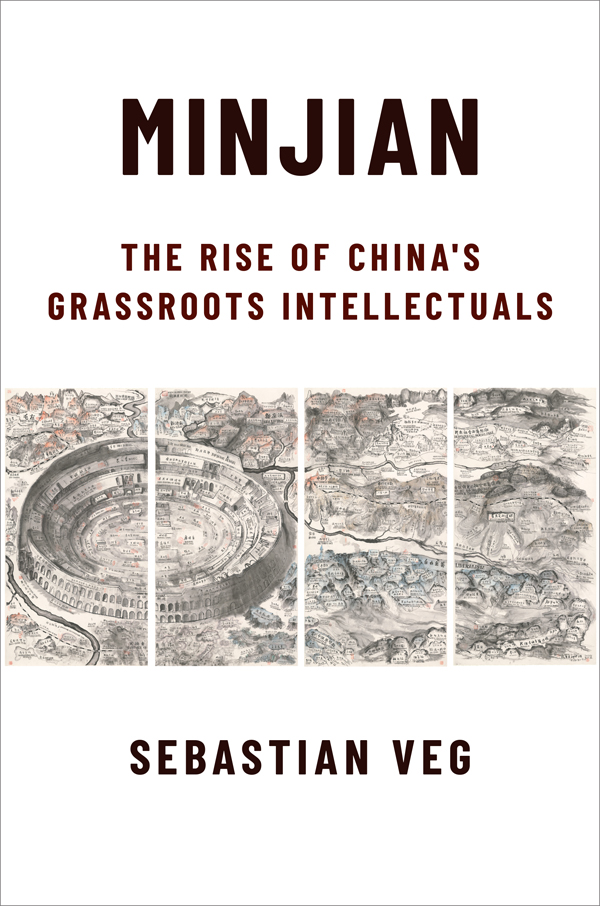Contents
Guide
Pagebreaks of the print version
MINJIAN

GLOBAL CHINESE CULTURE
GLOBAL CHINESE CULTURE
David Der-wei Wang, Editor
Michael Berry, Speaking in Images: Interviews with Contemporary Chinese Filmmakers
Sylvia Li-chun Lin, Representing Atrocity in Taiwan: The 2/28 Incident and White Terror in Fiction and Film
Michael Berry, A History of Pain: Literary and Cinematic Mappings of Violence in Modern China
Alexa Huang, Chinese Shakespeares: A Century of Cultural Exchange
Shu-mei Shih, Chien-hsin Tsai, and Brian Bernards, editors, Sinophone Studies: A Critical Reader
Andrea Bachner, Beyond Sinology: Chinese Writing and the Scripts of Culture
Jie Li, Shanghai Homes: Palimpsests of Private Life
Michel Hockx, Internet Literature in China
Lily Wong, Transpacific Attachments: Sex Work, Media Networks, and Affective Histories of Chineseness
MINJIAN
The Rise of Chinas Grassroots Intellectuals
SEBASTIAN VEG
Columbia University Press
New York
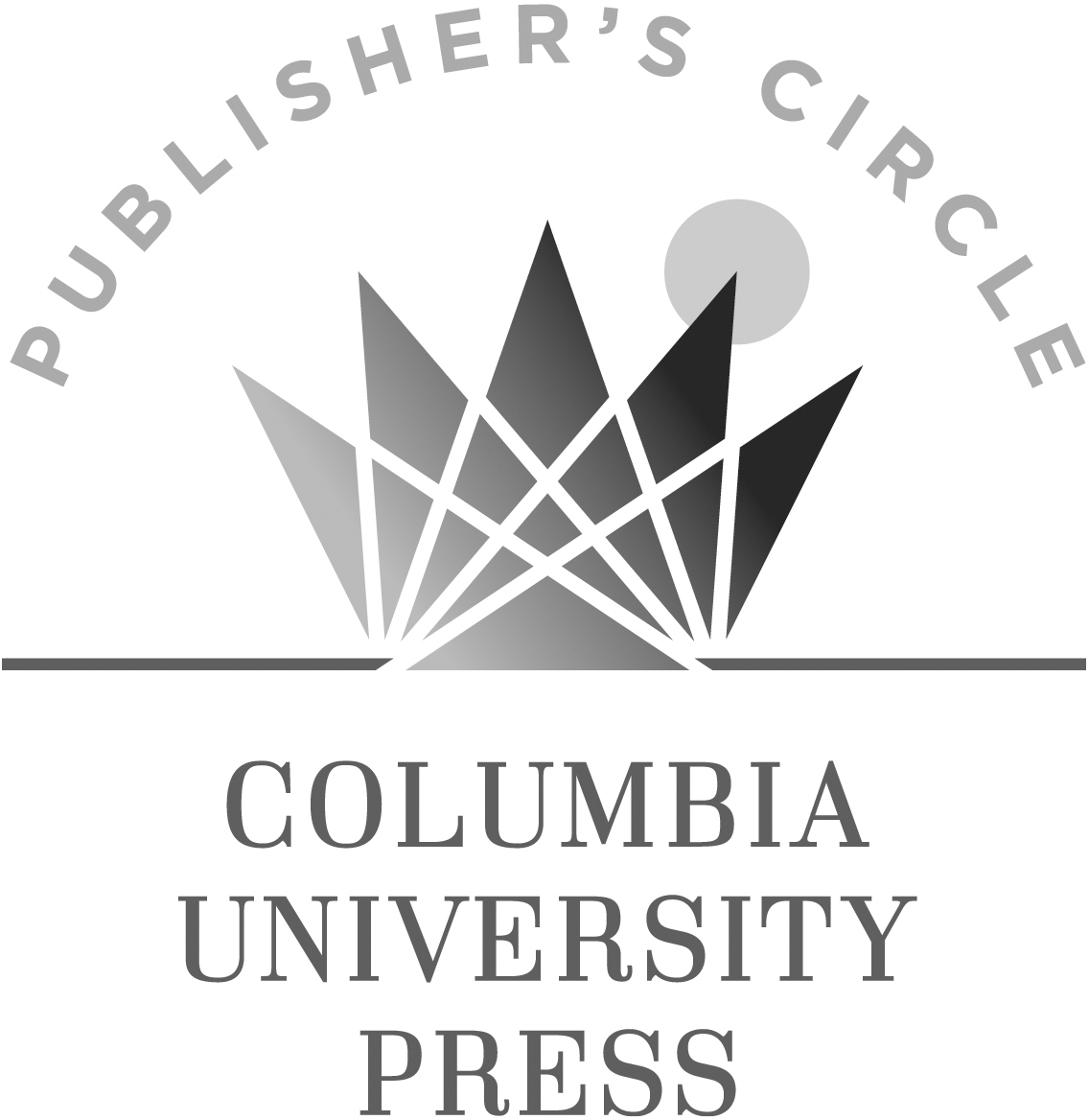
Columbia University Press gratefully acknowledges the generous support for this book provided by a member of our Publishers Circle in honor of Ms. Monica Shu-ping Chen Y.

Columbia University Press wishes to express its appreciation for assistance given by the Chiang Ching-kuo Foundation for International Scholarly Exchange and the Council for Cultural Affairs in the publication of this series.
Columbia University Press
Publishers Since 1893
New York Chichester, West Sussex
cup.columbia.edu
Copyright 2019 Columbia University Press
All rights reserved
E-ISBN 9780231549400
Cataloging-in-Publication Data available from the Library of Congress
ISBN 978-0-231-19140-1 (cloth)
A Columbia University Press E-book.
CUP would be pleased to hear about your reading experience with this e-book at .
Cover design: Chang Jae Lee
Cover image: Qiu Zhijie, From Huaxia to China , 2015, Ink on paper, Courtesy of the artist
Contents
T his book was researched and written in various stages over the last decade, during which time I have benefited immensely from the support and generosity of a great number of people.
Firstly I would like to thank friends and colleagues in Beijing, Shanghai, Chengdu, Kunming, and elsewhere in China who shared their insights, precious time, and material with me, in particular Ai Xiaoming, Chan Koonchung, Guo Yuhua, David Kelly, Lei Yi, Ma Li, Shao Yanjun, Sun Yu, Wang Bing, Wang Hongwei, Wang Hui, Wu Si, Wu Wenguang, Xiao Haisheng, Xu Jilin, Xu Zhiyuan, Yan Lianke, Yu Jian, Yu Jianrong, Zhang Enhe, Zhang Yihe, and many others whom I interviewed or corresponded with more sporadically. Special thanks are due to Wang Qinbo, who introduced me to Wang Xiaobo; to Laurent and Annette for their hospitality; and to Pierre Martin for his companionship during my research trips to Beijing.
Hong Kong, where I lived from 2006 to 2015, was an extraordinary place to conduct research on contemporary China, and I am grateful to colleagues in the French Centre for Research on Contemporary China (CEFC), The University of Hong Kong, and around town for their encouragement and many stimulating discussions. In particular I would like to thank Nicholas Bequelin, Jean-Philippe Bja, Michel Bonnin, Jean-Pierre Cabestan, Chan Kinman, Edmund Cheng, Cheung Lik-kwan, Frank Diktter, Jean-Franois Huchet, Theodore Huters, Lucas Klein, Leo Ou-fan Lee, Lin Pei-yin, Gina Marchetti, Aurore Merle, William Nee, Pan L, Judith Pernin, Eva Pils, Roseann Rife, Ilaria Maria Sala, Christoph Steinhardt, Teng Biao, Kristof Van den Troost, Esther Yau, Winnie Yee, Samson Yuen, Zeng Jinyan, and Yinde Zhang, as well as our much-missed colleagues Esther Cheung and PK Leung (Yasi). I can conceive of no better place for academic work than the stimulating interdisciplinary environment of the CEFC (especially the late evening sessions in Wanchai) and its incomparable staff, including Alfred Aroquiame, Adeline Chiu, Florent Chevallier, Heipo Leung, Hugo Petit, Romain Warnault, Henry Wu, and Miriam Yang. As editor and publisher of China Perspectives , I further benefited greatly from the many ground-breaking contributions on contemporary China we published over the years, many of which have found their way into the notes of this book.
Beyond Hong Kong, my work has time and again benefited from the critical interest and intellectual generosity of friends and colleagues in various corners of the world and of the contemporary China field, in particular Geremie Barm, Timothy Cheek, Gloria Davies, Rogier Creemers, Frederik Green, Hung Ho-fung, Seio Nakajima, Fumiaki Ozaki, Nicolai Volland, Wang Chaohua, and Jeffrey Wasserstrom. A special thank you is due to friends who follow contemporary China in Taiwan, especially Frank Muyard and Wu Jieh-min.
The finalization of the manuscript took place after my return to Paris to take up a position at the EHESS (School for Advanced Studies in Social Sciences), where I enjoyed discussions with an engaging set of colleagues within and beyond China studies, especially Antoine Lilti, Gisle Sapiro, Philippe Roussin, and Isabelle Thireau, who all contributed to helping me work out the framework of this study. I also particularly want to thank those graduate students who, throughout the seminars I offered on topics related to this project, raised critical questions and comments.
I was lucky to be able to present this book project at different stages and on various occasions: I am grateful for invitations and critical comments from Robin McNeal and Nick Admussen at Cornell University; Andy Nathan, Ying Qian, and Robbie Barnett at Columbia University; David Ownby, Timothy Cheek, Joshua Fogel, and Mark McConaghy in Montral; Gina Marchetti and Winnie Yee at HKU; Xu Jilin at East China Normal University (who organized an extremely fruitful discussion on minjian ); Daniel Leese at the University of Freiburg; and Masahisa Suzuki and Takahiro Nakajima at Tokyo University.
I would like to express my deep gratitude to David Der-wei Wang for his unfailing support for this project as series editor, as well as to the three anonymous reviewers.
Wendy Larson, whose pioneering work on Wang Xiaobo was instrumental in sparking my own interest in his writings, took the time to read the entire manuscript and send several pages of detailed comments, which made me feel a little less apprehensive about publishing this book. Eva Pils also read several chapters and provided material related to Gongmeng from her collection. I am deeply thankful to both of them.
Finally I would like to thank my familymy mother, Anja; my father, Ervin, who passed away just at the inception of this project; and my brother, Nicholasfor their support and (sometimes bemused) encouragement for all my projects.
I would like to thank Qiu Zhijie for allowing me to use his evocative painting From Huaxia to China for the cover of this book and Ian Johnson for helping track him down.
A section of was published as Opening Public Spaces, China Perspectives , no. 1 (2010): 410. I would like to thank Hong Kong University Press, Modern Chinese Literature and Culture, and the French Centre for Research on Contemporary China respectively for allowing me to reuse this material.


